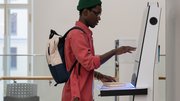News
Calif. county reconsidering touchscreen voting
February 23, 2003
SAN JOSE, Calif. -- The future of electronic voting may be altered this week in Santa Clara County, where county leaders are considering warnings that touchscreen voting machines are more prone to error and fraud than the systems they would replace.
According to a report in the San Jose Mercury News,the Santa Clara County Board of Supervisors delayed buying 5,000 ATM-like machines for 730,000 registered voters after hearing the concerns of computer security experts. California Secretary of State Kevin Shelley has convened a statewide task force on the security of touchscreen voting.
The crux of the concerns: The machines don't produce a paper record a voter can use to check that the machine has recorded his decisions accurately.
According to the Mercury News, three voting machine vendors vying for Santa Clara County's $20 million contract are saying they will install a paper audit system at no extra cost if the county becomes the first jurisdiction nationally to require it.
What the supervisors decide on Feb. 25, when they're scheduled to adopt a new voting system, will ripple through other California counties and is likely to impact the overall move toward electronic voting.
"What we have out in your jurisdiction is the first cut of people saying, `Wait a minute, shouldn't you have a physical ballot in case there is a recount?' It hasn't come up elsewhere because a lot of people haven't thought about it, or comprehended the need for it,' said Kimball Brace, president of Washington, D.C.-based Election Data Services political consulting firm and an expert witness in former Vice President Al Gore's court case to get a Florida recount in 2000.
In Silicon Valley, where about 42 percent of households have a member working in the technology industry, people may be more aware of the fallibility of computers. Some of the best brains in the cyber world, who live in the area, are among the loudest voices demanding that electronic ballots should also be printed on paper that voters can inspect. The county registrar would also keep a copy of the paper record to check the computer in case of irregularities or recounts.
"It goes to the heart of our democracy,' computer scientist Barbara Simons told supervisors in January. "If we care about democracy, there's no more important issue before this board.'
Santa Clara County, like many other counties, is under court order to replace its punch-card voting system by the 2004 presidential primary. After a nine-month process, the county staff recommended in January that supervisors negotiate a $20 million contract with Sequoia Voting Systems of Oakland, maker of electronic voting systems across the country.
Sequoia's systems don't produce paper ballots that voters can verify, and supervisors didn't ask for such a option in their bid proposal. According to vendors and election officials, paper ballots aren't needed because the machines have internal safeguards, are certified by federal and state governments and tested repeatedly before and after elections.
"We still believe they're secure,' Assistant County Executive Peter Kutras said on Feb. 21. "There are not any issues that should cause concern in terms of voter confidence.'
But just as supervisors were about to award the contract, they were stopped dead by an 11th-hour appeal from Stanford University computer scientist David Dill, who collected 300-plus signatures from scientists and technologists nationwide on a petition urging that the machines have a paper backup. They say it would be easy for a computer programmer to alter the way the machine counted votes during an election and keep changes from showing up on a test. They also say voting software, like any other kind, is not immune to bugs.
"The election could be running smooth as silk,' Dill said, "only the wrong person is elected and no one can tell. No one can prove it.'
After the 2000 presidential election, many states began moving to electronic voting. The number of registered voters casting their ballots electronically has more than doubled to 32 million people nationwide since the last presidential election. Last year, Californians approved $200 million in bond money to upgrade voting systems, just as a federal court, in a case brought by the American Civil Liberties Union of Southern California, outlawed punch cards such as the one used in Santa Clara County.
None of 510 counties nationwide using electronic voting machines last November required paper ballots be produced for voters to inspect at the time of voting. Though electronic voting ran smoothly in California's Riverside and Alameda counties, there were problems in other states, from poll workers not knowing how to turn on the machines to votes registering for the wrong candidates. Rice University computer scientist Dan Wallach tried to raise the paper-audit issue in Houston after the county there adopted electronic voting machines, to no avail.
"There was a certain combination of voter apathy and the naive Utopian view that it's new, therefore it must be better,' said Wallach, a computer security expert who made headlines as a Princeton graduate student when he found security flaws in Sun Microsystems' Java software, after the company claimed it was impenetrable. "David Dill had the unique advantage of being in an environment where people get it.'
Vendors and election officials say problems occur with touchscreen machines not because of fraud, but because counties didn't spend enough time training poll workers and introducing voters to the new technology. Santa Clara County officials fear that's what will happen here if the supervisors take any more time on security problems.
Even if supervisors order a paper audit installed, they can't purchase equipment until the machines are certified by the secretary of state, which could take months. Meanwhile, county officials want to have enough time to get the new voting system working by the November municipal and school district elections, as a trial run for March 2004.










